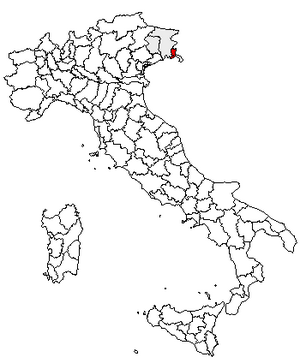Province of Gorizia facts for kids
Quick facts for kids
Province of Gorizia
Gorizia
|
||
|---|---|---|
|
||
 |
||
| Country | ||
| Region | Friuli-Venezia Giulia | |
| Capital | Gorizia | |
| Area | ||
| • Total | 466 km2 (180 sq mi) | |
| Population | ||
| • Total | 136,477 | |
| • Density | 293/km2 (760/sq mi) | |
| Postal Code |
34070-34079, 34170
|
|
| Telephone prefix |
0431, 0481
|
|
| ISTAT | 031 | |
| Vehicle registration | GO | |
| No. of communes | 25 | |
The Province of Gorizia is a special area in Italy. It is located in the northeastern part of the country. This province is part of a larger region called Friuli-Venezia Giulia.
Gorizia is known for its beautiful landscapes. It has a mix of mountains, hills, and flat areas. The province also shares a border with another country, Slovenia.
Contents
What is the Province of Gorizia?
A province is like a smaller division within a country. It helps manage different towns and cities. The Province of Gorizia is one of these important areas in Italy. It has its own local government.
Where is Gorizia Located?
The Province of Gorizia is in the very northeast of Italy. It is close to the Adriatic Sea. This location gives it a unique mix of cultures. You can find influences from both Italian and Slavic traditions here.
The Capital City: Gorizia
The main city and capital of the province is also called Gorizia. This city is famous for its history. It has been an important place for many years. The city of Gorizia sits right on the border with Slovenia. This makes it a special place where different cultures meet.
People and Size of Gorizia
The Province of Gorizia is not very large. It covers an area of about 466 square kilometers. This is roughly 180 square miles. In 2001, about 136,477 people lived there. This means it has a population density of about 293 people per square kilometer.
What Can You Find in Gorizia?
The province is home to 25 different towns and villages. Each one has its own charm. The area is known for its agriculture. People grow grapes for wine here. Tourism is also important, with visitors enjoying the history and nature.
The region has a rich history. It was once part of the Austro-Hungarian Empire. This past has left many interesting buildings and traditions. You can see old castles and historic churches. The local food is also a mix of Italian and Central European tastes.
See also
 In Spanish: Provincia de Goricia para niños
In Spanish: Provincia de Goricia para niños
 | Kyle Baker |
 | Joseph Yoakum |
 | Laura Wheeler Waring |
 | Henry Ossawa Tanner |


